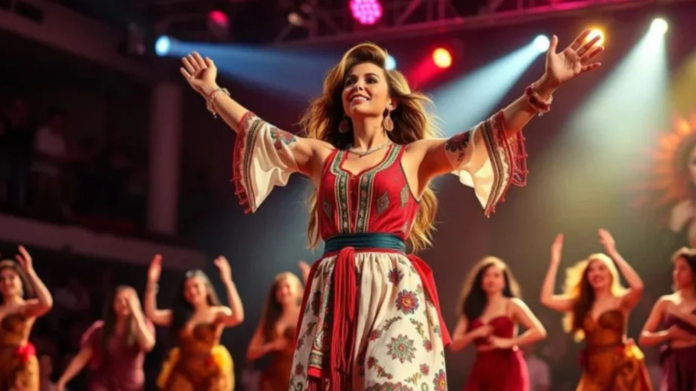Shakira Isabel Mebarak Ripoll, better known by her stage name Shakira, is a Colombian singer, composer, and dancer. Shakira has captivated audiences all over the world with her distinctive combination of musical styles, which includes Latin pop rock and dance. She began her musical path at an early age, creating her first song when she was only eight years old. She was born on February 2, 1977, in Barranquilla, Colombia, on the second day of February. Shakira Makedonka music and artistic expression have been heavily impacted by her multiethnic ancestry, for which her father is of Lebanese origin and her mother is of Colombian descent. Not only has Shakira utilized her platform to amuse, but she has also utilized it to advocate for a variety of social problems, which has further enhanced her cultural relevance as she has matured into an international icon. The fact that she can combine a variety of musical styles and include aspects from a wide range of cultures in her work has established her as a significant figure in modern music, demonstrating the significance of the impact of other cultures.
The Musical Journey: From Local to Global Stardom

Early Years and Breakthrough in Latin Music
When Shakira was just 13 years old, her debut album “Magia” was published, marking the beginning of her musical career. But it was her album “Pies Descalzos,” released in 1995, that introduced her to the Latin music world. With singles like “Estoy Aquí,” which became an anthem for young people throughout Latin America, this album displayed her distinctive style, which is defined by a blend of rock and traditional Latin elements. Shakira immediately gained a devoted following because of her upbeat live performances and unique vocals. She was already well-known in the Latin music scene by the late 1990s, which helped her breakthrough into the English-speaking market.
The Crossover: Entering the English-Speaking Market
With her fifth studio album, “Laundry Service,” in 2001, Shakira entered the English-speaking market. This album exposed her to a wider audience with “Whenever Wherever” and “Underneath Your Clothes.” Blending Latin and Western pop, the album made Shakira a global pop star. She broke barriers and set new standards for musicians trying to enter new music markets by easily switching languages and cultures. This time Shakira’s spectacular music videos and performances frequently including her Colombian ancestry confirmed her status as a global ambassador for Latin culture.
Cultural Impact: Beyond Music

Empowerment and Social Activism
Shakira has contributed to education and children’s rights outside her music. She started the Barefoot Foundation in 1997 to educate and feed underprivileged Colombian children. Shakira’s humanitarian work has changed the lives of many youngsters and boosted awareness of education as a right. She has encouraged many fans and fellow artists to give back, demonstrating musicians’ power to alter society.
Promoting Latin Culture on the Global Stage
Over and above her philanthropy, Shakira has promoted Latin culture worldwide. She has taught varied audiences Latin American rhythms, languages, and cultures via her music. Her songs use Colombian traditional music like cumbia and vallenato, promoting Latin cultural knowledge and respect. Shakira’s concerts typically include traditional dancers and instruments showcasing Latin American culture and her history.
Breaking Stereotypes: A New Representation of Latin Women
Shakira’s fame has changed how Latin women are portrayed in entertainment. Latin women have been stereotyped, but Shakira has shown herself as a complex artist with depth and creativity. Her strong intelligence and sincere public presence make her a global role model for young women. Shakira has inspired many to embrace their origins and follow their ambitions by embracing her identity.
The Shakira Phenomenon: Influences and Collaborations

Collaborations with Global Artists
Shakira has worked with many musicians from different genres during her career, which has increased her cultural impact even more. Her 2006 duet on “Hips Don’t Lie” with Wyclef Jean was a huge smash and demonstrated the smooth fusion of Latin and hip-hop rhythms. In addition to reaching the top of the charts everywhere, this song showed how Shakira can work with a variety of audiences. Furthermore, her collaborations with musicians like Jennifer Lopez, Maluma, and Rihanna have spanned genre boundaries and produced a diverse range of musical influences that capture the changing landscape of modern music.
The Role of Music Videos in Cultural Exchange
Shakira’s cultural impact has been greatly influenced by her music videos. Her films, which are well-known for their colourful choreography and images, frequently feature traditional Latin dance and cultural icons. For example, the music video for “La La La (Brazil 2014)” promoted cultural interchange via music and sports by showcasing the spirit of the FIFA World Cup and showcasing Brazilian dancers. Shakira’s reputation as a cultural ambassador has been cemented by her ability to tell visually striking stories that honour her roots while capturing the attention of audiences throughout the world.
The Legacy of Shakira: A Lasting Cultural Influence

Awards and Recognition
Numerous Grammy Awards Latin Grammy Awards and Billboard Music Awards are just a few of the honors and recognitions Shakira has received for her contributions to music and society. Her artistic brilliance and the contribution she has made to advancing Latin culture internationally are reflected in these accolades. In addition to honouring her accomplishments, Shakira’s status as a Latin music legend draws attention to the rising value of diversity in the music business and encourages the next generations of musicians to embrace their ethnic identities.
Shakira’s Influence on Future Generations
Beyond only her music and activism, Shakira has influenced a new generation of musicians to embrace their cultural heritage and push the limits of the genre.Many up-and-coming musicians cite her as a major inspiration, highlighting her ability to connect with listeners from various backgrounds and integrate different musical styles. Shakira’s success story inspires aspiring artists to pursue their dreams while remaining true to their identities, serving as a testament to the power of tenacity, creativity, and cultural pride.
Conclusion
To summarize, Shakira Makedonka is not just a sensation in the world of music; she is also a cultural phenomenon whose impact extends across national boundaries and language barriers. As a result of her extraordinary ability to combine many musical genres, advocate for social problems, and portray Latino culture, she has firmly established a place in the hearts of millions of people all over the world. The legacy that Shakira has left behind will continue to motivate future generations, serving as a reminder of the power that music possesses as a medium for cultural interchange and social transformation. As she continues to develop as an artist, her influence on the globe will persist. She will leave an indelible stamp on the cultural landscape for many years to come.
FAQs
What is Shakira’s background and early life?
In Barranquilla, Colombia, Shakira Isabel Mebarak Ripoll was born on February 2, 1977. Her eclectic upbringing with a Lebanese father and a Colombian mother shaped her creativity. Shakira wrote her first song at age eight and performed it in school. She developed her distinctive tone and approach to music from her eclectic ancestry and musical traditions.
What are some of Shakira’s most notable songs?
Shakira has had several global hits. Among her most renowned songs are “Hips Don’t Lie.” “Whenever Wherever,” “Waka Waka (This Time for Africa), and “La La La (Brazil 2014).” These tracks highlight her ability to mix pop rock and Latin rhythms. Her music celebrates ethnic variety with catchy melodies, uplifting words, and dynamic rhythms.
How has Shakira contributed to social causes?
Social activist Shakira is passionate about education and children’s rights. She started the Barefoot Foundation in 1997 to educate and feed impoverished Colombian children. Shakira’s organization has brought schools and educational activities to thousands of youngsters. She has also worked with UNICEF to promote children’s rights and education worldwide.
What role does Shakira play in promoting Latin culture?
Shakira promotes Latin culture with her songs and images. She showcases Latin American culture worldwide by using traditional Latin music styles and instruments. Her performances generally include Colombian folklore, highlighting her roots and promoting Latin culture. She has also helped other Latin performers obtain popularity in the worldwide music industry.


